7 Worst Drinks if You Have Arthritis

Rheumatoid arthritis is an autoimmune disease, and because of that, any food or drink that causes inflammation in your body should be avoided.
The acidity of the foods and beverages you consume is important too. When you ingest too much acid forming foods and drinks, you create an acidic environment, which also promotes inflammation and increases pain. You will see that almost all beverages on the list of drinks to be avoided have a pH value below 7, which means they are more or less acidic.
You might already know what foods to avoid ( like fried foods, processed foods, sugars, refined carbs, vegetable oils, etc.) but what about drinks? In this article we are going to focus on the worst possible drinks you should be avoiding as much as you can to keep the systemic inflammation under control.
Even if you don’t suffer from this serious health condition, it would be wise to avoid these beverages, as they bring nothing good to your body.
Table of Contents
Soda
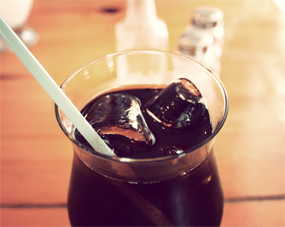 Soda is full of sugar, and sugar is very inflammatory. This should be a very obvious connection. If you need proof, there is a study by the researchers from the Harvard Medical School linking consumption of non-diet soft drinks to increased risk of osteoarthritis in men.
Soda is full of sugar, and sugar is very inflammatory. This should be a very obvious connection. If you need proof, there is a study by the researchers from the Harvard Medical School linking consumption of non-diet soft drinks to increased risk of osteoarthritis in men.
The other problem with soft drinks and sodas is they usually contain a lot of phosphoric acid. One of the major side effects of phosphoric acid in the human body is the loss of calcium and other essential nutrients and vitamins.
The third problem with soda is that it contains significant amounts of caffeine. Caffeine can worsen the symptoms of arthritis is some people.
For example, the American Autoimmune Related Diseases Association connected caffeine consumption with worsening the symptoms of inflammation related to arthritis. Furthermore, caffeine may interfere with some receptors controlling inflammation.
On top of all this, all sodas are very acidic, with pH values below 3.5. Read more about the adverse effects of soda HERE.
The bottom line: Avoid soda and soft drinks. You should avoid them even if you don’t have arthritis. Even if you are totally healthy.
Diet Soda
Diet soda contains no sugar, so you might be tempted to think that it is a better alternative than ordinary soda. But, when it comes to inflammation, that’s not necessarily true.
The artificial sweeteners are the problem. They enhance the probability of developing glucose intolerance and alter the microbiom (gut bacteria). When the body is unable to metabolize glucose the way it should, it releases cytokines — inflammatory compounds — the same way it does when you consume sugar or fried foods. By altering the microbiom, your body prevents the good bacteria from releasing anti-inflammatory compounds.
The bottom line: Diet sodas with artificial sweeteners are to be avoided the same way as you should avoid sugary drinks.
Energy Drinks
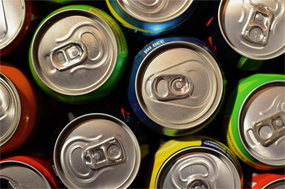 Energy drinks contain several times the amount of caffeine found in soft drinks or coffee. Given the above, it is clear you should avoid energy drinks if you have any autoimmune condition, including arthritis. So, avoid caffeine overload.
Energy drinks contain several times the amount of caffeine found in soft drinks or coffee. Given the above, it is clear you should avoid energy drinks if you have any autoimmune condition, including arthritis. So, avoid caffeine overload.
In addition, if you have gout, which is a type of inflammatory arthritis that occurs when the levels of uric acid in the blood are high, be especially cautious of caffeine. There is a study linking the consumption of too many caffeinated drinks with increased occurrence of gout attacks.
The pH values of most of the energy drinks is also below 3.5, indicating high acidity.
The bottom line: Avoid energy drinks as well because of their high levels of caffeine.
Coffee
 The scientific community cannot quite agree on coffee. There are studies claiming an increased risk of arthritis or osteoporosis, but other studies claim quite the opposite.
The scientific community cannot quite agree on coffee. There are studies claiming an increased risk of arthritis or osteoporosis, but other studies claim quite the opposite.
Given what we said about soft drinks and energy drinks and their caffeine content, it should be pretty obvious that coffee is also a problematic beverage.
However, unlike the above, coffee has some positive health benefits and a number of useful biologically active nutrients. The polyphenols contained in coffee have strong antioxidant and anti-inflammatory properties.
Still, be wary. Better yet, know you daily limit of coffee intake. Drink it in moderation. Some people can stand larger quantities, others almost none. If you are going to drink some cofee, make sure it is organic! Don’t mix it with milk or cream, and don’t add any sugar into it.
Just like the previous two, coffee is also an acidic forming beverage, so here is another reason to be moderate.
The bottom line: Science is not clear when it comes to coffee. Use common sense, know you limits and drink coffee in moderation.
Milk
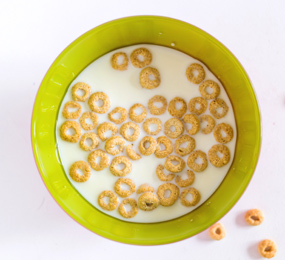 Despite some contradictory opinions, if you have any autoimmune condition milk is not so good for you. The problem with milk is not so much the fat, as it is the protein (casein is the main one) contained in all sort of diary. In case of some autoimmune diseases, the body forms a type of antibodies to casein, mistakenly seeing and vigorously attacking this protein as a foreign harmful substance.
Despite some contradictory opinions, if you have any autoimmune condition milk is not so good for you. The problem with milk is not so much the fat, as it is the protein (casein is the main one) contained in all sort of diary. In case of some autoimmune diseases, the body forms a type of antibodies to casein, mistakenly seeing and vigorously attacking this protein as a foreign harmful substance.
Casein will likely worsen any inflammation in your body, so if you have rheumatoid arthritis try to avoid milk. Milk can contain A1 or A2 type of casein, with slightly different effects on inflammation. Other fermented dairy beverages, like yogurt or kefir, may be a slightly better alternative, but they also contain casein.
The bottom line: Even though some people advocate using fat-free milk or yogurt, you should be avoiding milk or other dairy altogether because of the pro-inflammatory casein.
Beer
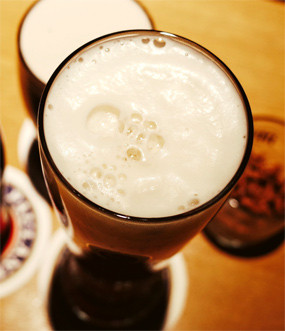 The problem with beer is that it is made from grains, and grains by definition contain gluten or other similar inflammatory proteins. What, barley, rye, and other grains contain gluten or gluten-like chemical substances that may cause inflammation and even maintain inflammation days after the beer has been consumed.
The problem with beer is that it is made from grains, and grains by definition contain gluten or other similar inflammatory proteins. What, barley, rye, and other grains contain gluten or gluten-like chemical substances that may cause inflammation and even maintain inflammation days after the beer has been consumed.
If you are sensitive to gluten, or if you have a Celiac disease, going gluten free may help you ease arthritis symptoms as well.
In addition, beer contains alcohol, which is a known factor for increased risk of developing gout. This is because alcohol can increase the levels of uric acid in the blood, which is directly related to gout.
The bottom line: Both the gluten content and alcohol content in beer are problematic for people with arthritis or gout.
Fruit Juices
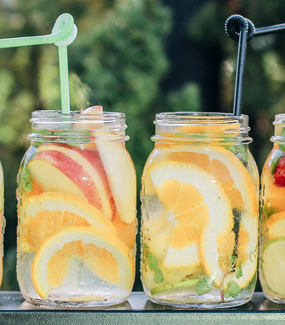 While some fruit juices are acceptable, most of them contain high quantities of sugar, including the most harmful type of sugar, fructose. Fructose is especially bad, because there is an one to one correspondence between the levels of fructose and the production of uric acid. Uric acid, in turn, causes gout. This is the case even if you make a cold pressed freshly squeezed home made juice: depending on the ingredients the levels of fructose might be high.
While some fruit juices are acceptable, most of them contain high quantities of sugar, including the most harmful type of sugar, fructose. Fructose is especially bad, because there is an one to one correspondence between the levels of fructose and the production of uric acid. Uric acid, in turn, causes gout. This is the case even if you make a cold pressed freshly squeezed home made juice: depending on the ingredients the levels of fructose might be high.
When your body breaks down fructose from the fruit juice, chemicals called purines are released in your bloodstream. These chemicals are further decomposed into uric acid, and if you running into a risk from gout flares. (Also, check out this purine rich food list.)
On the other hand, some fruit juices, like the tart cherry juice seems to be helpful. Tart cherry juice is anti-inflammatory, and seems to protect from osteoarthritis.
The bottom line: While fruit juices are delicious and refreshing, the fructose content in them can be problematic. You should inspect each type of fruit you are about to juice to check its fructose levels.
Conclusion
You shouldn’t be giving a second thought: eliminate the drinks listed above from your diet once and for all, and never think about them again.
There are many good substitutes. For example, what about pure clean water? There’s no better drink than that.
Or what about green tea, which is packed with anti-inflammatory benefits.
Or for example what about the extremely healthy turmeric ginger tea.
Not to mention green juices and green smoothies.
They can help you protect your body from inflammation, neutralize the free radicals, and considerably improve your health situation in case you have gout or rheumatoid arthritis.
Cheers!

Leave a comment